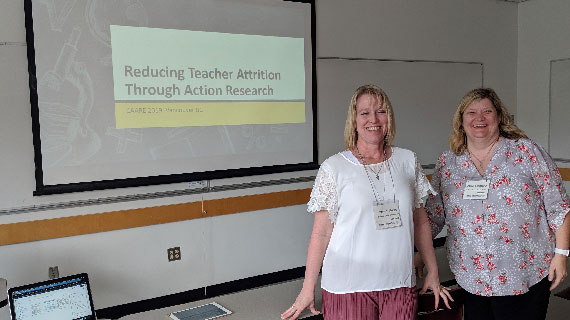SUU’s Master of Education Thesis Personalized for Educators
Published: January 21, 2020 | Author: Savannah Byers | Read Time: 3 minutes

Southern Utah University's Master of Education (M.Ed) program has recently shifted from a traditional thesis to a practitioner based research thesis, giving students the opportunity to personally apply their studies and research to individual classrooms and districts.
"Teachers are professionals who daily help shape the next generation, " said Assistant Professor of Education Joel Judd. "They face challenges that go beyond the classroom. Therefore, our master's program views teaching as more than just technical expertise. Practitioner research gives teachers a tool to reconstruct their work by deciding not only what to do, but when, and how, even whether to do it-- something an outside 'expert' can't tell them."
The Master of Education Curriculum includes 21 core requirement credits and 12 elective credits, which are usually used to add an endorsement or concentration. The thesis is completed over 3 courses beginning in 21st Century Research and Data (6030), growing more in-depth in Practitioner Research Thesis Writing (6650), and becoming the primary focus in Capstone Practitioner Research Thesis (6933).
Students begin their thesis by asking a question of personal and professional interest that relates to their classroom or district. They then employ different methods, resources, etc. to find a solution to their problem that works for their demographic. The research conducted is more action-based than other similar capstones, projects, and theses at other universities.
"Educators who engage with SUU's Master's of Education program prepare themselves to be better members of Professional Learning Communities on their respective campus'," said Professor/Director of Graduate Studies in Education Tony Pellegrini. "Their participation provides them with practical experiences in crafting a methodology designed to address the questions and concerns identified by their problem. Our master's students walk away with problem-solving skills to help them address the problems and issues our learners face in the 21st century."
Recent projects include:
Using Narrative Writing to Help Honors Students Improve Beyond Basic Formulaic Expository Writing
Belinda Fotu, a high school Language Arts teacher, used action-based research to explore how building a strong foundation in narrative writing can validate students' backgrounds and encourage social change, while improving their writing skills in other genres.
"I changed writing and reading curriculums to build a better foundation on narrative writing, especially those from writers of marginalized demographics," Fotu said. "I built curriculum to build from narrative as a foundation rather than an appendage genre study (the traditional method)."
How Does Teacher Clarity Impact Formative Assessments
Elementary school teacher Christina Hurley tackled the topic of "teacher clarity" in her research. She implemented strategies specific to her classroom based upon her findings.
"I can remember how lost I was at the beginning of this project and how daunting writing a thesis actually felt," Hurley said. "At some point it just seemed to click somewhere in lines of Dr. Judd's feedback. I still use a lot of the components I researched and studied today in my classroom."
How Can Science Help Students Want To Return To A Regular Classroom
Betty Jepson has been teaching at a Juvenile Receiving Center for youth in custody for five years. The goal of her thesis was to find student success by adding more scientific topics and experiment activities in her classroom.
"I learned from this course to never give up," Jepson said. "Dr. Judd was very patient and encouraged me. He gave me ideas without taking over my idea. My thesis was not as elaborate as others in my class, but I feel my findings were every bit as important."
"100 years ago the most famous U.S. educator John Dewey said teaching is 'reconstruction without end,'" Dr. Judd said. "As faculty, we grow along with our teachers by helping them ask and answer their own questions about teaching and learning, because they are the ones faced with those questions on a daily basis. In my 35 years as an educator, this is the most fulfilling and important work I know."
The College of Education and Human Development is a flagship program at Southern Utah University. The goals of the education department are to develop educators who are academically competent, experienced, prepared, understand the need for both art and science in education and have effective classroom management. Learn more about graduate studies in education.
Contact Information
435-586-5400
Contact the Office of Marketing Communication
This article was published more than 3 years ago and might contain outdated information or broken links. As a result, its accuracy cannot be guaranteed.

